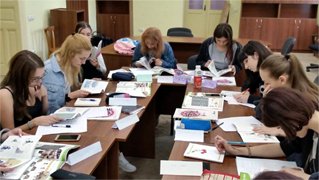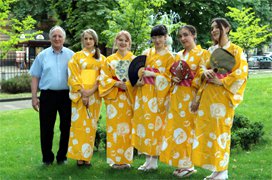Why Do We Learn and Why Do We Teach?
Ukraine-Japan Center “UAJC”
FUJISAKI Yasunori
The primary job of the Japanese-Language Specialist dispatched to Ukraine consists of administrative tasks, such as accounting, at the Ukraine-Japan Center (hereinafter “UAJC”), but I also provide support for Japanese-language educational activities in the various regions throughout the country. Accordingly, for this report, I will introduce the Language Camp as an example of those regional support activities.
While there are universities with Japanese-language programs in regional cities throughout Ukraine, such as Kharkov, Dnipro, Odessa, and Lviv, there is a shortage of Japanese-language educational resources because the local teachers have not received specialized training in teaching Japanese and have no access to advice on teaching, resulting in inadequate teaching methods.
To address this problem, I held a five-day Language Camp with the support of the Lviv Polytechnic National University from July 2 through 6, 2018. Though I called it a “camp,” it does not involve sleeping outdoors. Instead, participants are immersed in the Japanese language as they study it for the duration of the Camp. The participants in the Camp were 28 students studying Japanese at the university. The content of the Camp began with conversation practice in the morning using the “Marugoto: Japanese Language and Culture” (hereinafter “Marugoto”) teaching materials developed by the Japan Foundation. The afternoons involved an introduction of the content of the Japanese-Language Proficiency Test (JLPT). The students also practiced wearing Yukata (traditional summer kimono) as an experience of Japanese culture. The students dressed in the colorful Yukata and then asked to walk through the streets, which was at first “the most embarrassing experience” the students had ever experienced. But as they became more accustomed, they began to enjoy the experience and even posed for photographs.
In addition to the students, teachers of Japanese in Lviv also participated in the Language Camp. I had heard that the local Ukrainian teachers were not very good at conversation, so on the day before the Camp, I held a workshop on teaching conversation classes using Marugoto. I also had them run one of the classes during the camp.

Students trying the Tadoku reading for the first time

Students wearing Yukata.
[Reflection points] I divided the classes in to the three levels of beginner, pre-intermediate, and intermediate, but the students at the beginner level were obviously struggling from the start, and some were unable to complete the five-day program. The idea of being immersed in the Japanese language sounds like an effective idea, but in practice, the approach causes significant mental stress for beginners, as has been reported in research on immersion. Accordingly, I felt that I would need to place more emphasis on the intermediate program in the future. Also, while I feel it was a good idea to have the local teachers run a class as part of the workshop, I was unable to observe the class and provide feedback, so I hope to bring an experienced full-time lecturer from the UAJC next time to offer the teachers feedback and mentoring.
[Conclusions] I believe the Learning Camp was successful in two ways. The first is that the local teachers in Lviv, who previously had depended entirely on the ideas of teachers in Kiev, developed the motivation to try something at their own universities. The second is that the Camp has pointed the way for the future activities of the UAJC. The knowledge and experience of Japanese-language education amassed by the Japanese-Language Specialists and lecturers at the UAJC might be put to use within the organization, but it has not been put to use elsewhere. In the near future, I hope that the Camp and similar activities will generate more interaction between lecturers at the UAJC and teachers in other regions.
Why Do We Learn and Why Do We Teach?
I was dispatched to this position in the month of April just two years ago, and in April of this year, the last year of the Heisei Period, I spent my third spring in Ukraine. Sadly, according to a 2018 report by the International Monetary Fund (IMF), the GDP per capita in Ukraine has declined to 2,964 USD, lower than neighboring Moldova, which previously was the poorest country in Europe, giving that unfortunate position to Ukraine. Ukraine was once considered one of the richest countries in the Soviet Union, along with the Baltic States, but now it is a shadow of its former self, and the population has dropped from 52 million to 46 million as people seek to emigrate elsewhere, and there also seems to be no end to the number of Japanese-language teachers quitting their jobs as well. Given this seemingly hopeless situation, I had to ask myself, as the Japanese-Language Specialist, what the point of learning and teaching Japanese is. I asked myself what meaning there is to Japanese-language education. I have also increasingly felt a need for the learners to develop a sense of justice, such as listening to others, following the rules, and being considerate of others. Just as the students who participated in the Language Camp in Lviv truly enjoyed themselves through learning Japanese and experiencing Japanese culture, I feel that the development of a sense of justice by the young people of Ukraine through foreign language education will serve as one solution to Ukraine’s problems moving forward, both for the development of Japanese-language education and for the cultivation of the future citizens of this country.
- What We Do Top
- Arts and Cultural Exchange [Culture]
- Japanese-Language Education Overseas [Language]
- Japanese-Language Education Overseas [Language] Top
- Learn Japanese-language
- Teach Japanese-language
- Take Japanese-Language Test
- Know about Japanese-language education abroad
- The Japanese-Language Institute, Urawa
- The Japanese-Language Institute, Kansai
- Japanese-Language Programs for Foreign Specified Skilled Worker Candidates
- Japanese Language Education for Japanese Children Resident Overseas and for the Descendants of Migrants
- Archives
- Japanese Studies and Global Partnerships [Dialogue]
- JF digital collection
- Other Programs / Programs to Commemorate Exchange Year
- Awards and Prizes
- Publications
